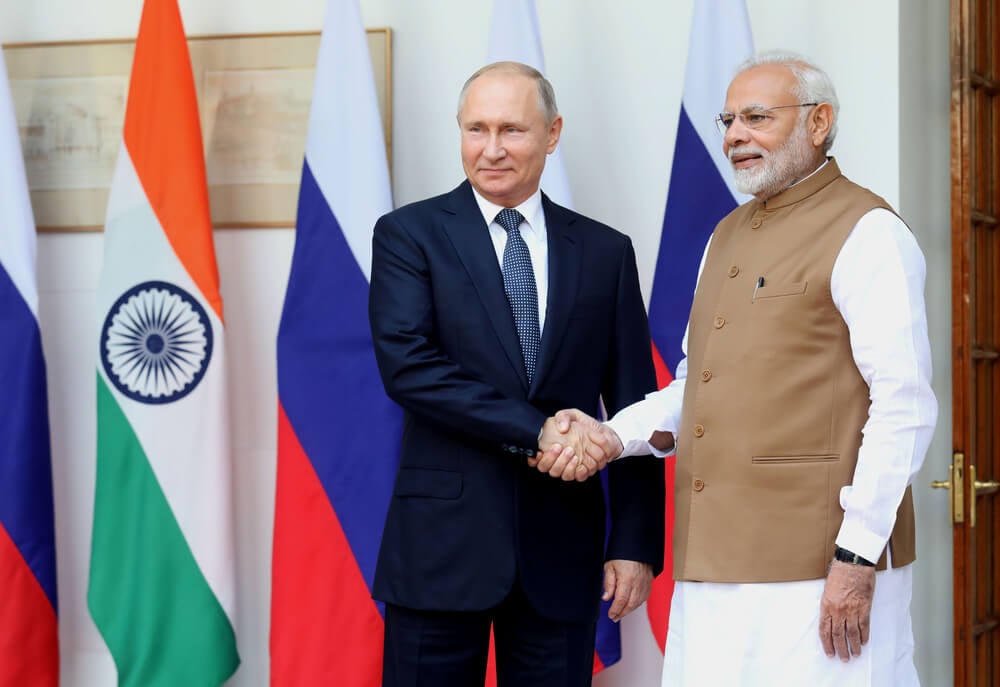India will continue to import large quantities of oil from Russia, using the restrictions on the price of Russian oil by Western economies to boost its economy.
India is determined to maintain the advantage it gained from the Western sanctions against Russia, and it is not willing to risk its rapidly increasing import of energy products from Russia by potentially violating these sanctions.
"If an entity is not under sanctions, there is no question I will buy from the cheapest supplier," Indian Oil Minister Hardeep Singh Puri told Reuters.
India's oil purchases from Russia have seen a large increase since the most developed Western industrial economies established a price cap of $60 for a barrel of Russian oil transported by sea at the beginning of 2023.
Steady growth in low-cost purchases exhibited results in July, when India surpassed China as the largest importer of Russian oil, which is also taking advantage of the market situation to procure oil at a low price.
India imported 2.07 million barrels of oil worth $2.8 billion from Russia in July, surpassing China's monthly imports of 1.76 million barrels via pipeline and sea.
In the same month, India also improved its record because imports from Russia accounted for as much as 44% of total oil imports, which is 12% more than a year earlier.
A boost to the growth of the Indian economy
The announcement by Indian oil minister Puri that he will continue on this course is a confirmation of the growing trends so far and reflects the ambition of the Indian government to play an increasingly important role in the global market.
India saw an opportunity to profit unexpectedly from a disrupted market due to the Russian invasion of Ukraine and the Western sanctions against Moscow.
Before the aggression against Ukraine, India imported only about 1% of its otherwise large oil imports from Russia. However, in just two and a half years, that share increased to more than 40%.
The Indian economy is heavily reliant on oil imports, with close to 90% of its needs coming from abroad
The Indian economy is heavily reliant on oil imports, with close to 90% of its needs coming from abroad. India sees an opportunity to improve its performance and succeeds when it can purchase oil at rates that lower the price cap of Western economies.
One of the reasons for the determination of the government in New Delhi to continue with the massive import of oil from Russia at low prices is that this energy moment could bring a competitive advantage in relation to the Chinese economy.
An advantage over competition from China
The decline of China's economic parameters is evident in the volume of oil imports, particularly from Russia, as China benefits from Russia's market issues and purchases its oil at a significant discount.
However, China's oil consumption is falling due to increased processing costs and reduced demand, so in July it imported the least amount of oil in the last year and a half (about 40 billion tonnes), which also includes reduced imports from Russia.
The West does not have many tools to pressure India to reduce its oil imports from Russia
The West does not have many tools to pressure India to reduce its oil imports from Russia, which would further reduce Moscow's financial potential to conduct war operations in Ukraine.
India, quite simply, is taking advantage of the market circumstance where it has access to a channel of very cheap oil, for which Russia has a limited market due to sanctions.
Also, the West must approach India with extreme caution and without pressure when it comes to its growing economic aspirations in order to keep it in the circle of its political and security partners in the Indo-Pacific region.
In this regard, the West tolerates India's growing oil trade with Russia because the circumvention of the sanctions against Russia takes place mostly in rupees, not dollars, through privileged Indian banks.
This represents an acceptable loss for the West because Moscow's benefit from growing Indian oil imports is not valued in dollars but is tied to the conditions set by India, which are certainly not favourable for Russia.
Political support
Indian PM Narendra Modi and Vladimir Putin will have the chance to politically confirm the previous agreements at the highest level and to support the continuation of the energy business at the forthcoming BRICS summit in Kazan, Russia, in October.
 Narendra Modi and Vladimir Putin will have the chance to politically confirm the previous agreements at the forthcoming BRICS summit in Kazan, Russia, in October
Narendra Modi and Vladimir Putin will have the chance to politically confirm the previous agreements at the forthcoming BRICS summit in Kazan, Russia, in October
In July, during a meeting in Moscow, Russia and India jointly "reiterated the importance of the robust and wide ranging cooperation in the energy sector as a significant pillar of the Special and Privileged Strategic Partnership" and emphasised "continued special importance on bilateral trade in energy resources and agreed to explore new long-term contracts."
It appears that there will be no change in the financial aspect of the oil arrangements either, since the July Indian-Russian declaration stated that they will work together "to promote a bilateral settlement system using national currencies."
India has no reason to alter these conditions, as it is aware that Russia is unable to request more favourable arrangements, faced with practically global restrictions, in which India, along with China, is a preferred customer.
India's oil imports from Russia have all the necessary conditions to continue growing, provided that the current low prices persist.